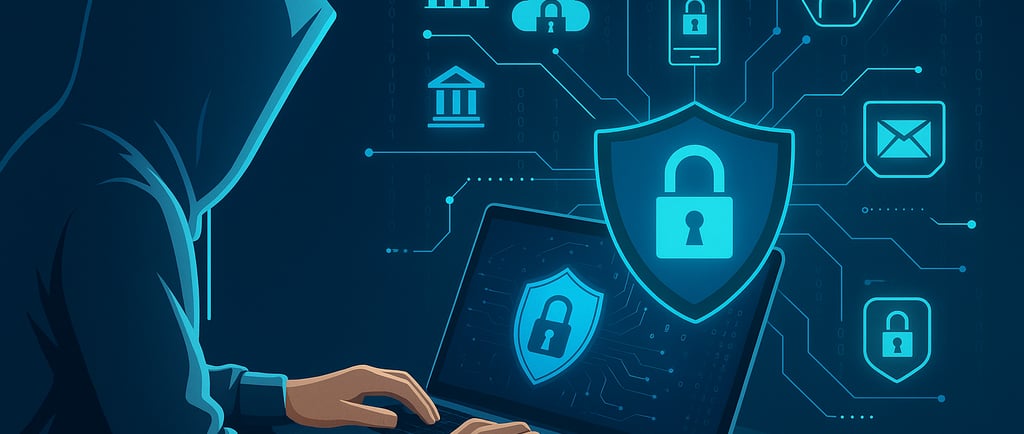VPNs and Public Wi-Fi – Why You Need One on the Go
VPN


Public Wi-Fi is everywhere—cafés, airports, hotels, libraries, and even public transportation. While convenient, these open networks are also one of the biggest security risks for internet users. Hackers love public Wi-Fi because it’s often unsecured, making it easy to intercept data. A VPN (Virtual Private Network) is the most effective way to stay safe while browsing on the go.
The Risks of Public Wi-Fi
When you connect to an open network, your data is often sent without proper protection. This opens the door to:
Man-in-the-Middle Attacks: Hackers place themselves between you and the network, intercepting your data.
Data Theft: Logins, emails, banking details, and personal files can be stolen.
Fake Wi-Fi Hotspots: Cybercriminals create rogue hotspots with names like “Free Airport Wi-Fi” to trick users.
Malware Injection: Unsecured networks can be used to spread viruses or spyware.
Without protection, simply checking your email at the airport could expose sensitive information.
How a VPN Protects You on Public Wi-Fi
A VPN keeps your data secure by creating an encrypted tunnel between your device and the internet. Here’s what that means for public Wi-Fi use:
Encryption of Data
– Even if hackers intercept your connection, all they see is unreadable code.Protection Against Fake Hotspots
– A VPN prevents data leaks even if you accidentally connect to a malicious hotspot.Hidden Browsing Activity
– ISPs, Wi-Fi providers, or snoopers can’t track which websites you’re visiting.Secured Logins
– Passwords, banking details, and private messages stay private, even on untrusted networks.
Everyday Scenarios Where a VPN is Essential
Airports: Travelers often log into airline apps, bank accounts, or email—prime targets for hackers.
Hotels: Many hotels reuse Wi-Fi passwords and don’t encrypt connections, making guests vulnerable.
Cafés: Public hotspots are common targets for fake networks designed to capture personal data.
Libraries or Public Spaces: Large, open networks with many users increase the risk of attacks.
Why Public Wi-Fi is a Hacker’s Playground
Hackers don’t need advanced tools to exploit public Wi-Fi. Basic software can:
Scan unencrypted traffic
Steal login credentials in real time
Monitor the sites you visit
Plant malware on your device
This is why cybersecurity experts consistently warn against using open Wi-Fi without protection.
Choosing a VPN for Public Wi-Fi
If you plan to use a VPN mainly for protection on the go, look for providers that offer:
Strong Encryption (AES-256) – The gold standard for securing data.
Automatic Wi-Fi Protection – Some VPNs automatically activate when you join an unsecured network.
Kill Switch – Ensures no data leaks if your VPN connection drops.
Cross-Device Support – Protects your phone, laptop, and tablet simultaneously.
Fast Connections – Ensures smooth browsing and streaming even on hotel or café Wi-Fi.
Tips for Staying Safe Beyond a VPN
A VPN is the foundation of public Wi-Fi security, but you can add extra layers of protection:
Use HTTPS Websites: Always check for the lock icon in the address bar.
Turn Off Auto-Connect: Disable automatic Wi-Fi connections to avoid rogue hotspots.
Update Devices: Keep your operating system and apps updated to patch vulnerabilities.
Avoid Sensitive Transactions: If possible, don’t access banking apps or make purchases on public Wi-Fi.
Final Thoughts
Public Wi-Fi is convenient, but it comes with serious risks. A VPN provides the protection you need by encrypting your data, hiding your activity, and securing your logins—turning an unsafe hotspot into a secure browsing experience.
Whether you’re a frequent traveler, a remote worker, or just someone who enjoys working in a café, a VPN is an essential tool for safe browsing on the go.
The bottom line: If you use public Wi-Fi, you need a VPN.